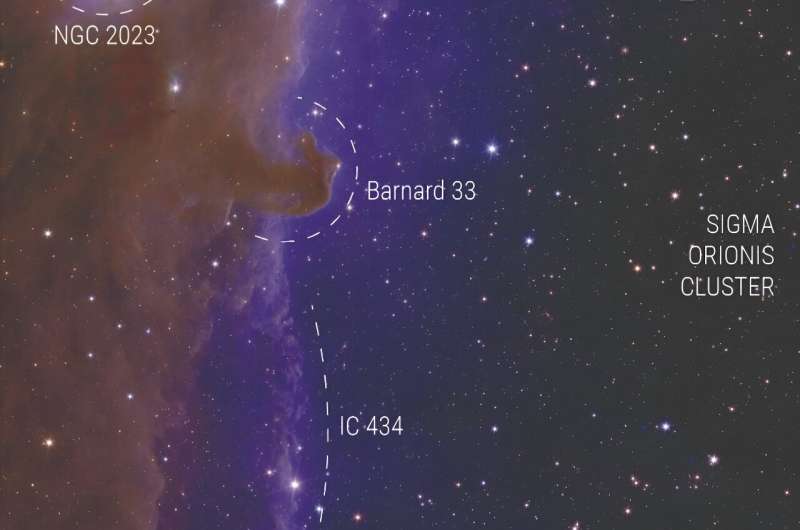This article has been reviewed according to Science X's editorial process and policies. Editors have highlighted the following attributes while ensuring the content's credibility:
fact-checked
preprint
trusted source
proofread
Euclid is finding free floating planets in Orion, too

There are likely millions of "rogue" or free-floating planets (FFPs) spread through the galaxy. These planets, which aren't big enough to become stars but also aren't beholden to a star's gravity, are some of the hardest objects for astronomers to spot, as they don't give off their own light, and can only be seen when they cross in front of something that does give off its own light.
Enter Euclid, a space telescope that launched last year. Its primary mission is to observe the universe's history, but a new paper describes an exciting side project—finding FFPs in Orion. The paper is published on the arXiv preprint server.
In particular, it is finding FFPs around a system known as Sigma Orionis. Famously located on the eastern side of Orion's Belt, this "star" is a system of at least five different stars, all gravitationally bound in one way or another, forming what is known as a "cluster." It's also surrounded by a "dust wave" of particles pointing at the nearby Horsehead Nebula, all of which lends itself to being a place where it would be easy to find FFPs.
Free-floating planets of this type can also be considered "failed stars" as they did not have enough mass to start the fusion process that comes with star formation. This isn't the first time they've been found in star-forming regions. Other FFPs have been found in NGC 1333, Collider 69, and even the Orion Nebula.
This isn't even the first time they've been found in Sigma Orionis—but it is the first time they've been detected with the accuracy Euclid allows. As the paper's authors put it, they "appear to be ubiquitous and numerous."
So what's unique about what Euclid did? Admittedly, the paper was a sort of test run for the telescope. The observations were taken back in October, only a few months after it launched in the middle of 2023. Those observations also focused on regions well known to contain tons of FFPs already. So what did it find?
They found a bunch of much smaller FFPs than had previously been found. Astronomers use an algorithm called the initial mass function (IMF) to describe the number of stars of specific sizes that would be formed. FFPs define the lower limit of that IMF—i.e., if an object isn't big enough to become a star, it becomes an FFP. Sufficiently smaller FFPs help astronomers define the limits of the IMF in certain regions, but so far, they have escaped the notice of less sensitive detectors.
That's where Euclid comes in. The authors point out how the lower end of the IMF is not well defined and describe how the data collected by Euclid could be used to flesh out models at the lower end of the spectrum. However, they also point out that this is still very early in Euclid's data collection cycle, and plenty more systems could prove exciting hunting grounds for smaller FFPs than have ever been seen before.
For now, though, this is an excellent first test case of Euclid's capabilities. Given the sheer number of objects that could be floating out there in the void, it will have plenty of other opportunities to find more, and it has already started looking in several other well-known places, according to the paper. It's got more than five years left on its planned mission duration, so there will undoubtedly be more papers describing many more FFPs in the future.
More information: E. L. Martín et al, Euclid: Early Release Observations—A glance at free-floating new-born planets in the sigma Orionis cluster, arXiv (2024). DOI: 10.48550/arxiv.2405.13497
Journal information: arXiv
Provided by Universe Today





















